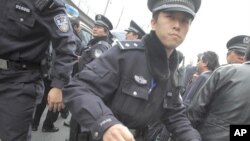China is changing how foreign journalist can work in the country and reporters are being warned they risk expulsion if they try to cover pro-democracy rallies. Some tourist areas of the capital and Shanghai now have the same off-limits rules governing sensitive areas such as Tibet.
In a tense news conference Thursday, Foreign Ministry spokeswoman Jiang Yu accused some journalists of deliberately inciting trouble while covering pro-democracy protests.
She warned those journalists accused of flouting the rules could not be protected under Chinese media laws.
Jiang said, however, that journalists who respect the rules will have the protection of the law.
She said there is no law to protect those who journalists who create what she described as "disturbances".
Jiang spoke after Chinese police warned foreign journalists this week to obey new restrictions on covering rallies called by an on-line protest campaign, or risking having their work visas canceled.
Jasmine revolution
Last Sunday, more than 16 journalists were physically harassed by plainclothes and uniformed police in Beijing, with one American journalist hospitalized after a severe beating.
The journalists went to an area in Beijing known as Wangfujing. An on-line campaign called for people to go to that area, and other locations around China, on Sunday afternoons, to show support for the revolutions sweeping the Middle East, and to seek justice and reform in China.
It appears, however, that few actual protesters showed up Sunday. In Wangfujing, journalists reported seeing scores of security officers.
Beijing and Shanghai have clamped down on security in response to calls for rallies. Some dissidents said they face new restrictions on their activities.
On Thursday, Jiang said repeatedly there had been no change in the reporting regulations that were made law after the Beijing Olympics in 2008.
These allowed reporters to interview people as long as they had their consent - and permitted foreign correspondents to travel without permission, except to sensitive areas, such as Tibet.
Media restrictions
But security officials have told some foreign journalists they must seek official permission to conduct interviews and to report in public in many areas.
Journalists were told they must have permits to report from Wangfujing, a shopping street popular with tourists next to Tiananmen Square.
Officials told some foreign journalists they can report freely anywhere else in China except in the protest areas - and to stay away from those.
Some journalists have applied to report from the protest sites this coming Sunday, but have been denied permission.
The United States, the European Union and media groups have condemned the media curbs.
China Threatens to Expel Foreign Journalists




